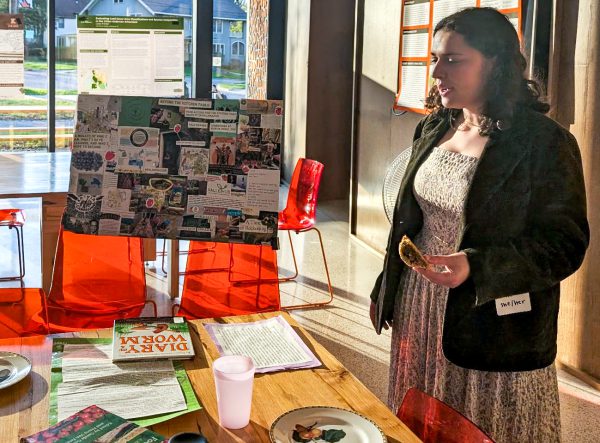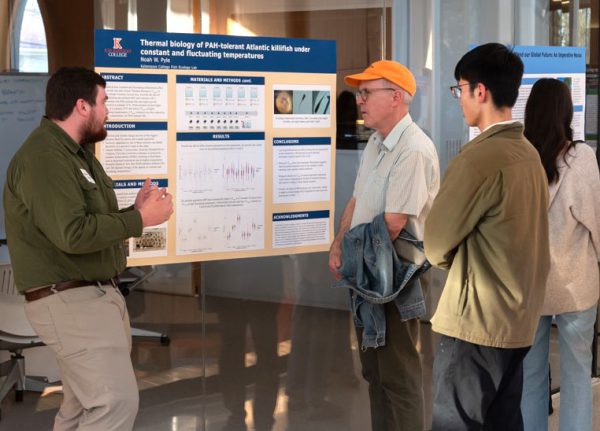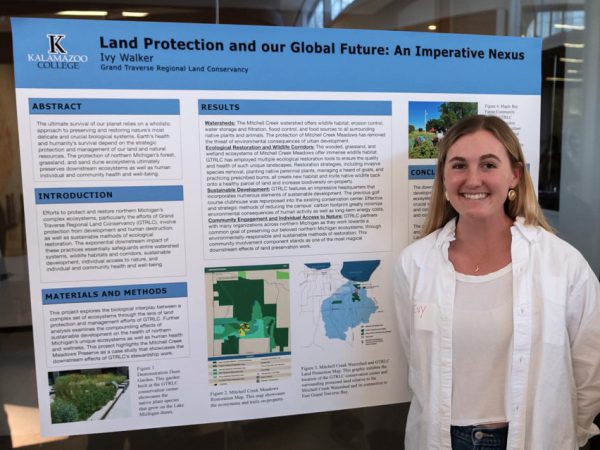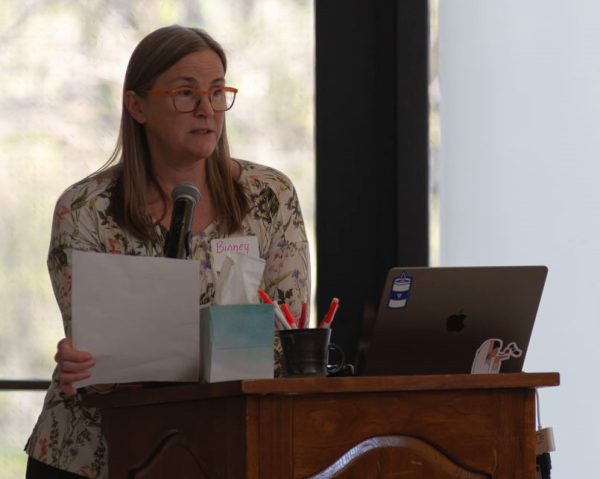It’s easy to think of issues that revolve around plant and animal life, greenhouse gas emissions and clean drinking water when it comes to studying sustainability and environmentalism. But what about food justice?
The food justice movement examines disparities in food access and health outcomes while seeking ways to provide all with nutritious, affordable and culturally appropriate food. At the same time, it promotes sustainable food systems that prioritize local and ethical production, reducing reliance on industrial agriculture and its associated environmental costs including reducing greenhouse gas emissions, water usage and land degradation.
Enter Tali Deaner ’25. With her Senior Integrated Project (SIP) addressing food justice, she was among 12 Kalamazoo College students who recently presented their research at the 2025 sustainability SIP symposium, sponsored by the Larry J. Bell ’80 Environmental Stewardship Center and K’s environmental studies concentration.
SIPs at K are capstone experiences, a lot like a senior thesis. Students are free to design their own project within their personal and professional interests in partnership with an advisor, and they’re always presented within a department symposium that aligns with a student’s major or chosen subject matter.
In Deaner’s case, she first highlighted her work through the Department of Anthropology and Sociology. However, students like her also find opportunities to present in additional specialty symposiums, if they so choose, leading to Deaner’s participation in the sustainability seminar.
“We have a lot of people who care about sustainability at K, but they don’t always know what to do about that,” Deaner said. “This symposium helped me talk to new people and they seemed to react well to my research. I’m glad I had the opportunity to do it.”
Deaner first got interested in food justice at K while working as a Civic Engagement Scholar for Club Grub through the Mary Jane Underwood Stryker Center for Civic Engagement. Founded in 2009, Club Grub is an afterschool program at Kalamazoo Public Schools’ Woodward Elementary that explores healthful eating and gardening. Woodward and K students share experiences and ideas about what they eat and where their food comes from. Each week they make a snack or meal together, often inspiring the K and Woodward students to try a new food for the first time.
In her research, though, Deaner examines food justice from a historical perspective by looking at issues such as real estate redlining, food access and food apartheid, which have contributed to food injustice up to the present day. She hopes an examination of the past could help the city gain a better understanding of what Kalamazoo can do in partnership with local organizations going forward, so residents can have equitable access to nutritious, affordable and culturally appropriate food.
“My message to the city of Kalamazoo would be to listen to the people who are already doing the work,” she said. “Organizations like the foodbank Loaves and Fishes, Chartwells—which is the Kalamazoo Public Schools food provider—and the Kalamazoo Valley Community College Food Hub are doing some great things. But there’s a job for everyone. We need the involvement of people who pass out food at food banks, the fundraisers for local organizations, and the people at the Western Michigan University medical school, who map food access for the sake of pediatrics.”
Deaner’s project is one example of how the sustainability seminars are growing while including projects from various disciplines and continuing to build momentum through students and their advisors. This year alone, for example, Brooke Dolhay ’25 conducted research in the Philippines examining coral reefs there and why so many of them are dying; Lucas Priemer ’25 measured the circumference of specific trees at the Lillian Anderson Arboretum to estimate how much carbon they capture, showing the value of a forest in sustainability; and Westin Grinwis ’25 integrated traditional ecological practices into outdoor orientation programs such as K’s LandSea.
“I couldn’t have been prouder of this year’s presenters,” said Binney Girdler, a professor of biology and the director of K’s environmental studies program. “They worked really hard on their posters and narratives, and it showed. They knew their projects backwards and forwards; not one used or needed notes to give their presentation. After the event, I heard from several College and community members about how professional and engaging the students were. We had great turnout from younger students, friends, family, faculty, staff and community members. The fact that the event had such positive vibes when the subjects covered included so many dire problems humanity faces is entirely due to the passion and caliber of our sustainability minded students.”




